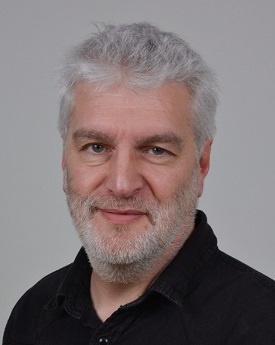Keynote Speakers

Professor Jozef Colpaert (University of Antwerp)
The role of Open Data and Corpora in the Contextualization of the Language Learning and Teaching process
About the speaker:
Jozef Colpaert teaches instructional design, educational technology and CALL at the department of Training and Education Sciences and at the School of Education in the faculty of Social Sciences of the University of Antwerp. Originally a language teacher, developer of a wide range of language courseware packages and manager of a research team in the 1980s and 1990s, he has been editor-in-chief of Computer Assisted Language Learning since 2002 and organizer of International CALL Research Conferences since 2004. His current research focuses on educational engineering, motivational language task design, courseware design, natural language structure and transdisciplinarity. His keynote presentations often include bold, funny and provocative position statements.
Abstract:
Design mainly consists of applying universal principles and adapting those to local and individual aspects, taking into account the specific characteristics of ‘the context’.
The notion of context in literature is a multifarious concept. On the one hand, context is seen as an ecology of factors and actors that may impact on the learning process. This impact is being described in terms of limitations, but also in terms of affordances. On the other hand, context is also often considered as an environment to be designed by the teacher (in a socio-constructivist, situated learning or simply motivational approach).
In fact, we can say that there are four types of contexts: the sociocultural context, the educational context, the geotemporal context and the learning environment. All four do have an impact on learning, but the first three types of context also impact on the design process that leads to the fourth: the learning environment.
In this presentation, we will focus on the role of Open Data and Corpora in the contextualization process. We will analyze in more detail the extent to which we can use information about the location of the learner (proximity of artefacts, information sources and contacts) in order to enrich the learning experience with relevant and motivating tasks and activities. To what extent can we use Open Data and Corpora in order to provide tailor-made, relevant and meaningful content?
Jozef Colpaert will try to convince the participants that this geotemporal contextualization will become one of the most exciting research topics in CALL, given the simplicity of the technology to be developed and the numerous application possibilities in language education.

Professor Glenn Stockwell (Waseda University)
Learning in the Wild: Living and Learning with Mobile Devices
About the speaker:
Glenn Stockwell (Ph.D., University of Queensland) is Professor in Applied Linguistics at Waseda University, Tokyo, Japan. His research interests include designing language learning environments through technology, language teacher and learner motivation, mobile learning, and the development of learner autonomy. He is the author of three books and numerous articles and book chapters in the field of technology in language teaching and learning.
Abstract:
The impact of mobile devices in education has exceeded the expectations of many teachers and at the same time failed to meet the expectations of others. Mobile-assisted language learning has expanded beyond relatively humble beginnings of replicating computer-based activities assigned in formal language learning contexts, and it now often consists of a complex mix of formal and informal learning activities that take place at different times and places throughout learners’ daily lives. In saying this, we still have little idea of how learners do engage in language learning activities with their mobile devices, particularly when this learning takes place outside of class. Decisions about what tools to use are often driven by the costs, choice of hardware, and the knowledge of what tools actually exist, and how these tools are then used will depend on learners' skills, motivation, as well as their short- and long-term goals. The presentation describes learning through mobile devices in terms of “lifelong mobility”, that is, how learning fits into the everyday lives of learners as humans living their lives. The complexities involved in understanding each individual learner’s own ecological context as well as how these ecologies shift over time will be discussed with an eye on optimising learning opportunities for learners that will keep them engaged in learning throughout their lives.

Professor Gu Yueguo (Beijing Foreign Studies University)
A Critical Appraisal of Online Education Design from a Reflective Practitioner
About the speaker
Gu, Yueguo, M.A., Ph.D., Dr. Lit. honoris causa (all from Lancaster University), is a research professor and Director of Corpus and Computational Linguistics Research Centre of the Chinese Academy of Social Sciences. He is also the holder of Special Titled Professor, Director of China Multilingual Multimodal Corpora and Big Data Research Centre, Beijing Foreign Studies University, and Director of Aging, Language and Care Research Centre, Tongji University/CASS. His research interests include pragmatics, discourse analysis, corpus linguistics, rhetoric and online education. His latest publications include The Routledge Handbook of Pragmatics (co-edited), The Encyclopedia of Chinese Language and Linguistics (co-edited, 5-volumes, Brill), Using the Computer in ELT, Pragmatics and Discourse Studies, and Chinese Painting. He has also edited several series of textbooks, and collections of academic papers such as Initial Exploration of Online Education, Second Exploration of Online Education. He is a member of the editorial boards for many international journals. He was the winner of five national top research prizes, and was awarded a K. C. Wong Fellow of the British Academy in 1997. He is a holder of many honorary posts, most noticeably special professorship of the University of Nottingham, Adjunct Professor of West Sydney University, Visiting Lecture Professor of Peter the Great St. Petersburg Polytechnic University, and Distinguished Research Fellow of Sydney University. (Personal website: www.multimodalgu.com)
Abstract
Society, Norman (1993) observes, “has unwittingly fallen into a machine-centered orientation to life”, an orientation reinforced even further by the lockdown imposed by the pandemic Covid-19. Online learning no doubt provides a way to rescue formal education from a total collapse. At the same time, as Norman warns us, “things that make us smart can also make us dumb”. Advantages e-learning technology affords us may equally blind us from seeing its weaknesses, i.e., its constraints on the development of human intelligence.
This paper attempts to maintain a sober balance by appraising critically the designs of online education programmes over the last decade. The appraisal is made by a reflective practitioner, i.e., the current author himself, who has been the key designer for Beiwaionline Education Platform, iContent Platform, and a hundred e-learning courses. In a sense, the paper presents a case study of pros and cons concerning a field practitioner’s decade-old designing practice. It is worthy, so the author assumes, of a CALL Community’s attention, because it is intended to act as a mirror against which the community members may also take a look at their own practices.
The appraisal includes the following: (1) fundamental principles of e-learning design; (2) a critical evaluation scheme; (3) designing educational management system; (4) designing content management system; (5) designing user-computer interaction interfaces; (6) reflections and regrets.
Reference cited:
Norman, D. (1993). Things that make us smart: Defending human attributes in the age of the machine. Reading: Addison-Wesley Publishing Company.

Professor Chen Haojan (National Taiwan Normal University)
Developing and Promoting a Comprehensive OER Website for English Learners in Taiwan
About the speaker
Howard Hao-Jan Chen (Ph. D, University of Pennsylvania) is Distinguished Professor at National Taiwan Normal University, Taipei, Taiwan. Professor Chen has extensive experiences developing various CALL websites and he also published papers in Computer-assisted Language Learning, ReCALL, English for Specific Purposes, Interactive Learning Environments, and Journal of Educational Computing Research. His research interests include computer-assisted language learning, corpus research, and second language acquisition. He is now developing and maintaining a large English Learning website, Cool English, serving about 500,000 elementary and secondary school students in Taiwan.
Abstract:
It’s critical for EFL students to develop good English ability in this globalized world. To enhance EFL students’ motivation and English ability, an innovative English online learning website (Cool English: http: www.coolenglish.edu.tw) was developed by English department of National Taiwan Normal University. The research and development funding for this website was provided by Ministry of Education. The site has three major sections to serve elementary school, junior high school, and senior high school students. This website has adopted a wide variety of new CALL technologies. For listening, many interactive videos and even movies were prepared for students, and there are tools for students to adjust speech rate and to consult an online dictionary. For speaking, advanced automated speech recognition technology and AI chat bots were developed to facilitate speaking skills. Students can get instant feedback about their pronunciation via the website and cellphones. Materials for Google Assistant were also created. For reading, interesting OERs multimedia books and quizzes are available. For writing, a free grammar checker is available, it can provide feedback similar to Grammarly. In addition, to make English learning more engaging for young learners, several types of digital games were also developed. These games include a 3D role-playing games, various HTML5 games, unity-based English games. In addition to these, there are various exam preparation materials for students at different levels. So far, this website has more than 550,000 registered users. To better understand the needs of our users, Matomo, a web analytics application, was installed on our website. The tool helps to track online visits and display reports on user behaviors.

Professor Randi Reppen (Northern Arizona University)
Using corpus resources to inform teaching and learning
About the speaker:
Randi Reppen is Professor of Applied Linguistics and TESL at Northern Arizona University (NAU) where she teaches in the MA and Ph.D. programs. She has extensive ELT and teacher training experience, including presentations and workshops in over 25 countries. Randi has a keen interest in using corpus research to inform language teaching and to develop better language teaching materials. She is co-editor with Doug Biber of Cambridge Handbook of Corpus Linguistics (2015), and the lead author of two corpus informed grammar series, Grammar and Beyond (2012), and Grammar and Beyond Essentials (2019), both with Cambridge University Press. In addition, Randi’s research has appeared in academic journals including, the International Journal of Corpus Linguistics, the Journal of Second language Writing, the International Journal of Learner Corpus Research, and TESOL Quarterly. In her spare time, Randi enjoys many outdoor activities.
Abstract:
Awareness of the use of corpus-informed or corpus-based materials for language instruction has increased over the last several decades, however, there remains much to be resolved before widespread use is practical. This presentation explores three approaches for using corpora and corpus information to inform language instruction. The approaches range from using existing corpus-based research and corpus-informed materials, to carrying out classroom-based corpus research. The approaches move from: 1. a focus on teachers’ relationships with existing research and materials; 2. a focus on learners’ use of online resources; 3. back to a focus on teachers, but with the goal of teacher as researcher. The three approaches can be used individually, or in combination depending on the instructional goals and student level. Each approach is described through detailed examples and practical classroom-based applications using freely available tools and websites.

Professor Alex Boulton (University of Lorraine)
Three decades of data-driven learning: Lessons from the past for the future
About the speaker
Alex Boulton is Professor of English and Applied Linguistics at the University of Lorraine and director of the research group “Analyse et Traitement Informatique de la Langue Française” (ATILF: UMR 7118, CNRS & Université de Lorraine). Particular research interests centre on corpus linguistics and potential uses for ‘ordinary’ teachers and learners (aka data-driven learning). He has published and edited books and papers in these fields over the years, and is on various boards and committees for scientific journals and associations: ReCALL (editor), Alsic, ASp, CALL-EJ, the EUROCALL Review, IJCALLT, JALT-CALL Journal, Language Learning & Technology, Al-Lisaniyyat; AFLA (Association Française de Linguistique Appliquée; vice-president), EUROCALL (European Association for Computer Assisted Language Learning) and TaLC (Teaching and Language Corpora).
Abstract:
Corpus tools and techniques were very early appropriated by teachers and learners of foreign or second languages, with published research on their use beginning to appear over 30 years ago. Largely associated with work by Tim Johns who coined the term ‘data-driven learning’ in 1990, the approach has given rise to large quantities of academic publications such that it can be difficult to take stock of the whole. This paper reviews a number of syntheses and meta-analyses, and presents recent work conducted in association with Nina Vyatkina that attempts to collate as exhaustive a collection of empirical evaluations of DDL as possible. Extensive trawls uncovered 489 studies up to and including 2019; these were coded and additionally been converted to txt for a searchable corpus of over 2.5 million tokens that can provide key words and n-grams to gain an initial picture of the field. For a historical perspective, they are divided into five time periods; questions of ‘quality’ are examined by separately analysing 117 that were published in internationally ranked journals. The results show a generally healthy field featuring tremendous variety on some dimensions, though there may be a reluctance to embrace new types of tools and activities, and methodological rigour and transparency can clearly be improved. Under-researched areas and designs can be taken as suggestions for future avenues and opportunities.
- Abstract submission opens
4 October 2020- Abstract submission deadline
3 January 2021 15 February 2021- Notification of acceptance
no later than 26 March 2021- Registration opens
- 29 March 2021
- Early-bird registration closes
10 May 2021- Registration for presenters closes
17 May 2021- Standard registration closes
- 1 June 2021
- Conference Dates
- 7 - 9 July 2021
